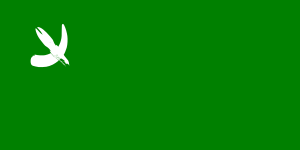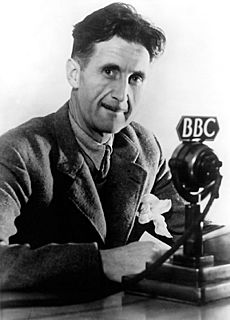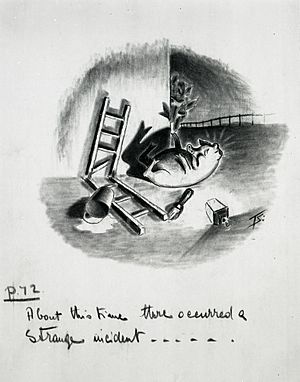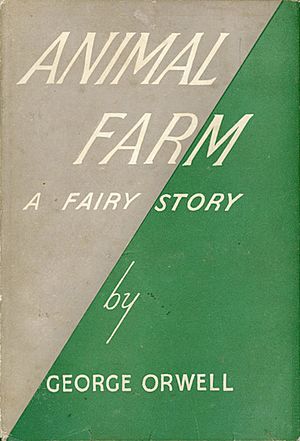Animal Farm facts for kids
Animal Farm is a short novel written by George Orwell. It was created during World War II and published in 1945. The story is about a group of farm animals who rebel against their human farmer. They dream of a place where all animals are equal, free, and happy. However, their dream is sadly betrayed, and the farm ends up being as bad as it was before.
This story is an allegory. This means the author used the animal story to represent real-life events. It is one of the most famous allegories about political history. The book is based on Joseph Stalin's betrayal of the Russian Revolution.
Many publishers first said no to the book. But once it was published, Animal Farm became a huge success. It is one of Orwell's two most famous books. The other is Nineteen Eighty-Four. Many people see Animal Farm as a classic book. Time magazine called it one of the 100 best English novels from 1923 to 2005. It also won a Hugo Award in 1996.
Contents
Story Summary

Manor Farm is run by Mr. Jones, a very unkind farmer. One day, the animals meet to hear Old Major. He is a wise old pig. Old Major gives a speech, telling the animals to rise up against their human farmers. The animals love this idea. Old Major dies a few days later.
The pigs are the smartest animals. They start planning the rebellion. Two pigs, Snowball and Napoleon, lead them. About three months later, the animals revolt against Mr. Jones. They take over the farm and change its name to "Animal Farm." They decide that only animals will rule the farm now. They call their new system "Animalism."
The Seven Commandments
The animals write seven commandments. The most important one is "All animals are equal." The sheep learn a simple chant: "Four legs good, two legs bad." Mr. Jones and his friends try to take back the farm. But in the "Battle of the Cowshed," the animals bravely fight them off. Mr. Jones runs away and never comes back.
Napoleon Takes Control
Snowball and Napoleon start to disagree. They have different ideas about how to lead Animal Farm. Snowball wants to build a windmill. Napoleon does not agree. Napoleon secretly trains nine young puppies. These puppies grow into fierce dogs that obey only him. When the dogs are grown, Napoleon uses them to chase Snowball off the farm. Napoleon then takes control and rules the farm all by himself. He becomes a dictator.
Napoleon uses his dogs to kill any animal that disagrees with him. A pig named Squealer keeps telling the other animals that everything is fine. He says they should always support Napoleon. Napoleon then changes his mind and decides to build the windmill. He pretends it was his idea all along. The first windmill they build falls down. Napoleon blames this, and other problems, on Snowball. He claims Snowball is sneaking around Animal Farm, ruining everything. Many animals are killed for supposedly helping Snowball.
Working with Humans
Napoleon starts working with humans outside the farm. This used to be forbidden. One of these humans is Mr. Frederick, a nearby farmer. Mr. Frederick brings men who invade the farm. They destroy the second windmill. The animals fight them off in the "Battle of the Windmill." This battle costs them many lives.
As the animals build a third windmill, Boxer, their strongest horse, becomes old and weak. He collapses. Napoleon sends him away to be killed, even though Boxer was loyal. The pigs continue to work with humans. They start to act like humans too. They live in the farmhouse and even walk on two legs. They teach the sheep a new chant: "Four legs good, two legs better." The original commandments are replaced by just one: "All animals are equal, but some animals are more equal than others." In the end, the other animals watch the pigs talking with humans. They can no longer tell the difference between the pigs and the humans.
Book Background

George Orwell was a socialist. He was against dictatorship, which is when one person has all the power. He especially disliked the communist government of Joseph Stalin in the Soviet Union. In 1936 and 1937, Orwell fought in the Spanish Civil War. He saw how democratic groups were pushed out by pro-Soviet communist groups. In 1947, Orwell wrote that he created Animal Farm to show the truth about the "Soviet myth."
Orwell also said he got the idea for the story from seeing a young boy whipping a large cart horse. He thought, "If only these animals knew how strong they were, we would have no power over them." He felt that humans use animals in the same way that rich people use poor people.
Characters in the Book
Many characters in Animal Farm are based on real people. They are grouped into pigs, horses, humans, and other animals.
Pigs
- Old Major – An old, prize-winning pig. He inspires all the animals to rebel against the humans. He is based on Karl Marx and Vladimir Lenin, who were leaders of the Russian Revolution.
- Napoleon – A large male pig. He first leads the revolution with Snowball. Then he takes all the power for himself. He is the main villain of the story. He is based on Joseph Stalin. He is named after Napoleon, who took over the government after the French Revolution.
- Snowball – A pig who is one of the early leaders of the revolution. He is liked by the other animals. He wants to make Animal Farm a fair place. He is mainly based on Leon Trotsky. Napoleon later blames everything that goes wrong on Snowball.
- Squealer – He is Napoleon's public speaker. He convinces the other animals to support Napoleon, no matter how bad his rule is. He lies and twists the truth. He represents "propaganda," which is news or art used to make people support something.
- Minimus – A poet who writes new songs for Animal Farm. He creates poems and songs that praise Napoleon.
Horses
- Boxer – A very loyal and hardworking cart-horse. He is the strongest worker among the animals. He is loyal to Napoleon, who later betrays him. Boxer and his friend Clover represent the working class during the Russian Revolution.
- Clover – A motherly horse who is getting older. She is Boxer's friend and takes care of him. She also works as a cart-horse. She sometimes doubts the pigs' actions. But she thinks she must be remembering things wrong. She later understands the situation but cannot express it. She represents the educated working class.
- Mollie – A silly, pretty, and vain young white horse. She loves sugar. When sugar is banned, she secretly brings some to the farm. When she is found out, she leaves for another farm. She represents the rich people of the Russian Revolution. They were happy with their lives and many fled the country after the revolution.
Humans
- Mr. Jones – The farmer of Manor Farm. The animals rebel against him because he treats them badly. He does not feed them or care for them. He is based on Tsar Nicholas II.
- Mr. Pilkington – The farmer of Foxwood, a large farm nearby. He and his farm represent the United States. He and Napoleon argue at the end of the story. This represents the start of the Cold War.
- Mr. Frederick – The owner of Pinchfield, a small but well-kept farm nearby. He briefly works with Napoleon. But he cheats the animals and later invades them. He represents Adolf Hitler.
Other Animals
- Benjamin – An old donkey. He is grumpy but very smart. He is a friend of the horses. He is thought to represent older people who are wise enough to see through lies but do not speak up.
- Moses – An old raven who visits the farm. He tells the animals stories about a heavenly place called Sugarcandy Mountain. He says all animals go there when they die if they work hard. Moses is thought to represent the Church in Russia at that time.
- Muriel – A wise old goat who is friends with all the animals on the farm.
- Bluebell and Jessie – A pair of dogs. Napoleon takes their puppies away from them when they are born.
- The Sheep – The sheep are said to be the least intelligent animals. They blindly follow Napoleon. They chant slogans like "Four legs good, two legs bad." Napoleon sometimes uses their chanting to stop other animals from talking.
- The Hens – The hens are among the first to rebel against Napoleon.
- The Dogs – Napoleon raises nine puppies to be his bodyguards and secret police. They only serve Napoleon. They kill anyone who is against him.
- The Cows – The pigs steal their milk. The milk is mixed into the pigs' food every day. The other animals are not allowed to have any.
- The Cat – The cat never does any work. But she is forgiven because her excuses are very convincing. She is not interested in the farm's politics.
Animalism Beliefs
Animalism is a system of beliefs shared by the farm animals of Manor Farm. Its goal is to make sure farm animals act like true animals. They should not follow the ways of human beings. So, any human behavior is seen as going against Animalism.
Beasts of England Song
"Beasts of England" is a song in the story. The tune is described as a mix of "La Cucaracha and Oh, My Darling Clementine." Old Major teaches the song to the animals early in the story. It becomes very popular. It becomes the first national anthem of Animal Farm. Later, Napoleon orders a new song to be written. This new song praises him instead.
The Commandments
These are the original commandments set by the pigs:
- Whatever goes upon two legs is an enemy.
- Whatever goes upon four legs, or has wings, is a friend.
- No animal shall wear clothes.
- No animal shall sleep in a bed.
- No animal shall drink alcohol.
- No animal shall kill any other animal.
- All animals are equal.
The sheep are taught a simpler chant: "Four legs good, two legs bad." Napoleon sometimes makes the sheep chant this to stop other animals from talking.
As the story continues, the pigs start changing the commandments. For example, "No animal shall drink alcohol" becomes "No animal shall drink alcohol to excess." By the end of the story, all the commandments are gone. Only "All animals are equal" remains, but it is changed to "All Animals are equal but some animals are more equal than others." Also, the sheep's chant changes to "Four legs good, two legs better."
Images for kids
-
Foreign Office copy of the first instalment of Norman Pett's Animal Farm comic strip. This example was commissioned by the Information Research Department, a secret wing of the Foreign Office which dealt with disinformation, pro-colonial, and anti-communist propaganda during the Cold War
See also
 In Spanish: Rebelión en la granja para niños
In Spanish: Rebelión en la granja para niños
 | Ernest Everett Just |
 | Mary Jackson |
 | Emmett Chappelle |
 | Marie Maynard Daly |



